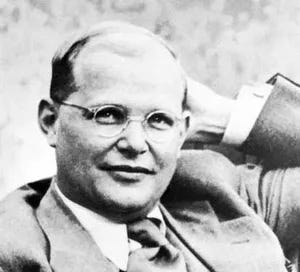My apologies in the lateness of this final Lenten themed post. I had it mostly ready, and my proofreader pointed out a flaw in my illustration of Bonhoeffer. It took me a while to resolve it, and the next thing I knew, it was weeks later.
Although we have ended Lent and entered the Easter season, this post is the last one related to the number 42, the “Answer to the Ultimate Question of Life, the Universe, and Everything.” We have not covered everything in this season, but it has been interesting to reflect on particular Bible chapters that otherwise might never be placed together. Out of the six books with a Chapter 42, I skipped Ezekiel, as that chapter is part of a lengthy description of one of Ezekiel’s visions. I also omitted Sirach 42, as that is part of the Apocrypha and decided to stick to the 66 books that are found in Protestant Bibles.
That brings us to Jeremiah 42. Jeremiah is a prophet during the time when God’s people enter exile. Here is a short summary of this chapter:
The military commanders and the people who are the remnant of Judah and exiles in Babylon, ask Jeremiah to pray to God on their behalf to ask for guidance.
Jeremiah agrees.
The people thank him and promise multiple times to do whatever God tells them to do.
After ten days, God tells Jeremiah, who relays the message to the people: Stay here in Babylon. Put down roots. If you stay, I will build you up. If you put down roots, I will plant you. Don’t be afraid of the king of Babylon. Warning: If you decide to leave, if you don’t listen to me and go to Egypt where there’s no war, no famine, where it is safe, then you will die.
God tells the people to stay put, in Babylon, where they are in exile, where there is risk and threat and fear. God tells them to stay uncomfortable and to not seek safety. It reminds me of the stories of a few historical figures.
One is Dietrich Bonhoeffer, a German pastor who took a public stance against Nazism and was in New York in 1939, where he was safe. In fact, friends encouraged him to stay in the U.S. and not return to his native country. However, Bonhoeffer wrote this response: “I have come to the conclusion that I made a mistake in coming to America this time. I must live through this difficult period in our national history along with the people of Germany. I will have no right to participate in the reconstruction of Christian life in Germany after the war if I do not share the trials of this time with my people.” Bonhoeffer left the safety of the U.S. in order to join the resistance in his own country with his own people. He decided to not take advantage of the opportunity to have safety and comfort and avoid suffering. Bonhoeffer was arrested by the Gestappo (the Nazi police) in 1943 and executed in April 1945, eighty years ago this month. He felt he needed to risk his safety and live (and die) with his countrypeople through the terrors of the Nazi regime.
Bonhoeffer’s story is a little different than Jeremiah 42. He was relatively safe in “exile,” away from his home country. It’s likely he would have lived if he had stayed put. Instead, for him, returning to his native roots was the right thing to do, even though it was the riskiest move he could make.
Another example is Harriet Tubman. After escaping slavery by making her way to the North, she returned to the South multiple times to free other enslaved people. While it was not a permanent move like Bonhoeffer’s return to Germany, each trip put her safety and life in jeopardy. She used her freedom, and endangered it, to work for the freedom of others.
Very rarely do we endanger ourselves on purpose. Generally, we don’t like to stay where we’re uncomfortable. We don’t like to put down roots in discomfort. We don’t like to stay where we don’t feel safe. Rather, we like to play it safe. We like comfort and safety and security and stability. We like expecting and counting our daily bread instead of praying for it. Stability and safety are basic needs.
Yet, we have entered an unstable and insecure time in our country’s history. We've alienated our allies of 80 years. Longterm civil servants have been fired. 47 creates crises so that he can gain more power. If we were to continue in Jeremiah, we’d read that the people claimed that the prophet lied to them, that God didn’t really tell them to stay where life was uncertain. But sometimes the uncomfortable place is where God calls us to be and to stay even when we’d rather not. It may be on a large scale, like fighting injustice or working for change from within an institution. Or it may be more personal, like not running away from your problems, or sitting with someone in their grief. Either way, it requires prayer and discernment to know when to stay and when to go. May we have the courage to stay the course even when we’d rather be somewhere that felt safer.





Thank you for sharing! I haven't seen that come across my feed (yet) :-)
this is the text from a protest poster that is currently circulating on social media
"We all place ourselves in danger to one degree or another when we stand up.
However, we place our children and grandchildren in even greater danger when we don't."